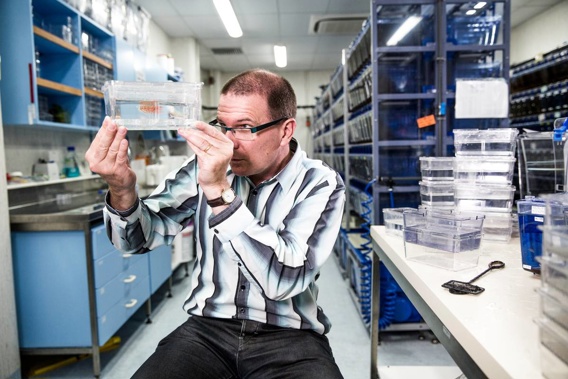
Meet the Kiwi DNA detective helping children across the globe.
World-renowned paediatric geneticist Professor Stephen Robertson has steadily been helping unravel obscure diseases, while giving fresh hope to countless children across the planet.
They include some we'll likely never hear about - let alone be able to say - like macrophagic myofasciitis, faciooculoacousticorenal syndrome and reflex sympathetic dystrophy.
Those ailments number among some 7000 rare genetic diseases that touch the lives of around seven per cent of our population.
A diagnosis with one could be a scary prospect for families, given the sheer lack of knowledge about them, let alone a lack of therapy or cure.
Roberston's run of breakthroughs stretch back to 2002, when he discovered a rare disorder which afflicted a Māori whānau from the Far North he'd met while working at Starship Children's Hospital.
Robertson, now based at the University of Otago, was moved by their tragic history, which involved four of the women losing seven baby sons between them.
The babies were deformed at birth and died soon after.
After years of hard toil, he eventually identified a gene responsible for the babies' deaths, enabling a diagnosis and potential genetic testing to answer some of the whānau's concerns heading into the future.
/arc-anglerfish-syd-prod-nzme.s3.amazonaws.com/public/HP3HYIBVM5ARNG2CEO6UBCFR7A.jpg)
Professor Robertson, a world-renowned paediatric geneticist based at the University of Otago, has been helping unravel rare genetic disorders affecting countless families. (Photo / Supplied)
But not only did he find a name and a diagnostic gene test for the disorder, his research helped turn a corner in the understanding of human development and led to insights into many diseases well beyond this single condition.
The offending gene turned out to be implicated in a raft of congenital syndromes - surprising many geneticists internationally.
It was these eureka moments and the ability to help diagnose disorders that appealed to him.
"What we're about is helping people understand and live with disability as best they can, and part of that's through giving information about what causes it."
His latest breakthrough has revealed the root of another condition called recessive spondylocarpotarsal synostosis syndrome, which led to the fusion of bones in the spine and limbs.
After DNA samples from 16 children were shipped from all corners of the globe to Robertson's Dunedin laboratory, he and colleagues began hunting for the culpable gene mutated in the disorder.
Cutting-edge sequencing technology allowed them to decode every single one of the six billion letters that comprise our genetic make-up, or genome.
"By sifting through them all, we can often find some kind of spelling mistake which accounts for the condition," he said.
But in this case, the search wasn't straightforward.
"We found half the answer, and we knew it was half the answer because the characteristics of the condition meant we had to find two genetic variations - or two spelling mistakes - in every person who had the condition," he said.
"As it turned out, we could only find one - so we knew we had a hunt on to find the other one."
They later discovered why the other variation was elusive: it lay hidden among the "non-coding" DNA that isn't involved in programming our proteins, but still makes up the vast bulk of our genome.
"Fortunately, it was in a part of the genome that we pretty well knew the function for, so we could actually see it as abnormal."
Robertson was ultimately able to confirm, for the first time, that there really was more than one implicated gene - something which could help not just even better diagnose the condition, but perhaps even treat it.
In other research, published in May, Robertson's team took part in a worldwide collaboration using new genome sequencing technologies which found a new gene for a rare neurological disorder characterised by malformations of specific structures in the brain.
The researchers sequenced 65 separate families with this conditition and then pooled their data and results with a wider international team to make the new finding after analysing more than 200 families with the condition.
It involved clinical and molecular geneticists from all over New Zealand, Australia, Europe and the United States.
He said the power of this study lay in the ability to collaborate closely with international colleagues and lend expertise to the combined effort.
/arc-anglerfish-syd-prod-nzme.s3.amazonaws.com/public/LA4HT6HXJJDURFNXC3ED2CZXNE.jpg)
"Our work shows that no only can we do it here, but do it really well and even find the causes for new conditions," Robertson says of his work at Otago Medical School. (Photo / Supplied)
"All of this activity illustrates that so called genomically-informed medicine has arrived and can lead to more accurate, earlier and more efficient diagnoses for children, especially," he said.
"We are using this technique extensively in my lab and diagnosing many New Zealand children with genetic diseases under our research protocol.
"Our work shows that no only can we do it here, but do it really well and even find the causes for new conditions."
Cure Kids research and innovation director Tim Edmonds described Robertson as a "rare talent ... a gifted clinical geneticist and a world-class scientist".
Fifteen years ago, the charity provided Robertson with certainty of long-term funding for his research, and over time he has used the support of their donors to establish a specialist lab now pioneering the study of the genetic determinants of an increasing number of rare disorders in children.
"It is exciting that Stephen and his team are able to provide answers for families from New Zealand and around the world, when no one else can," Edmonds said.
"As well as training the next generation of talented researchers in his lab he is also now helping lead the future thinking about how New Zealand can best utilise rapid advances in genomic technologies to improve outcomes for our children."
Take your Radio, Podcasts and Music with you









